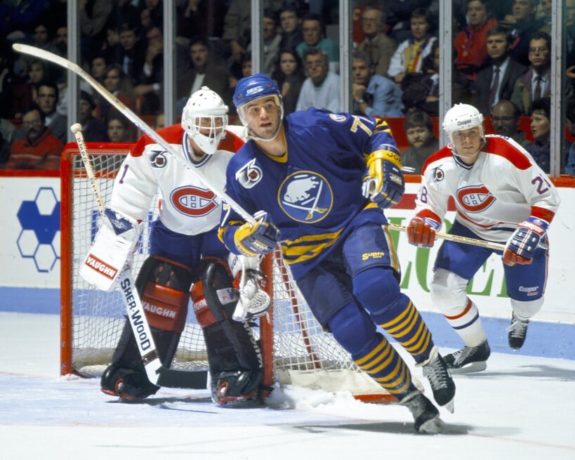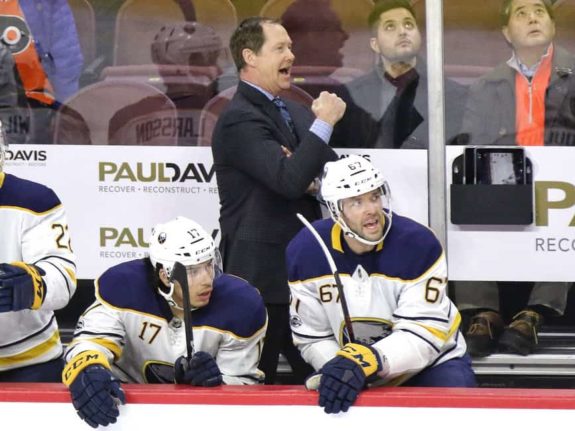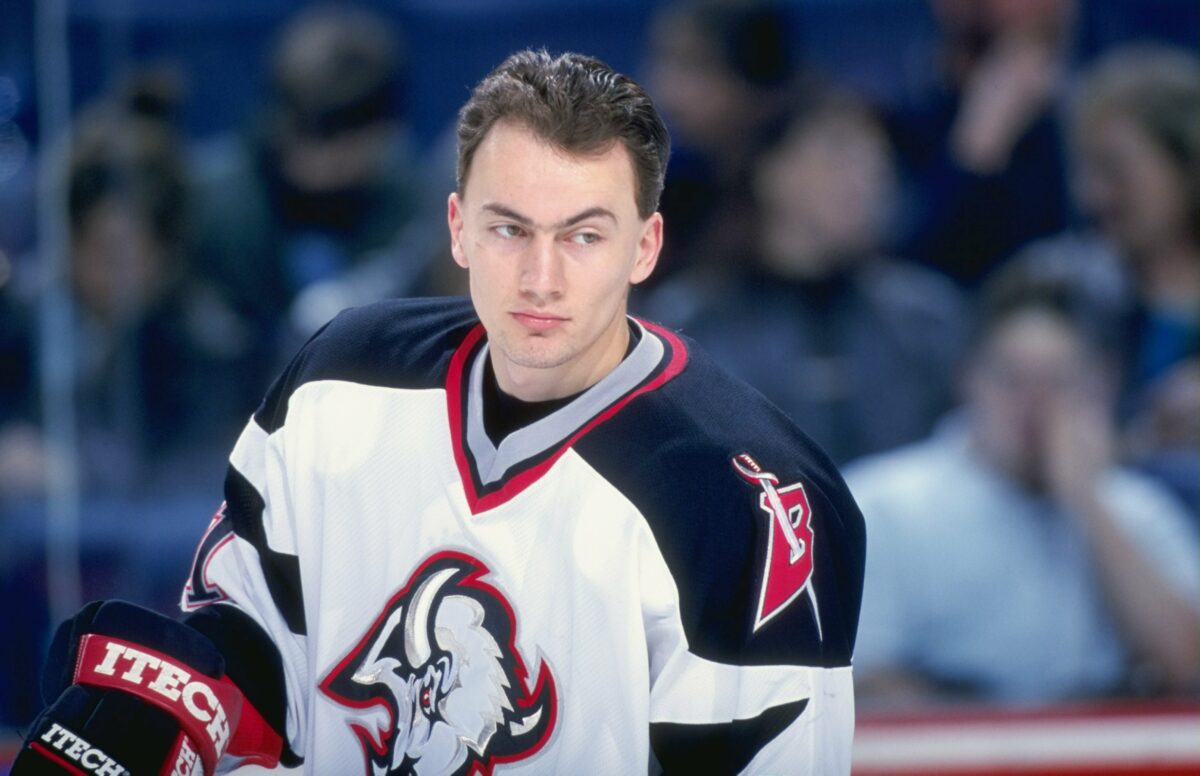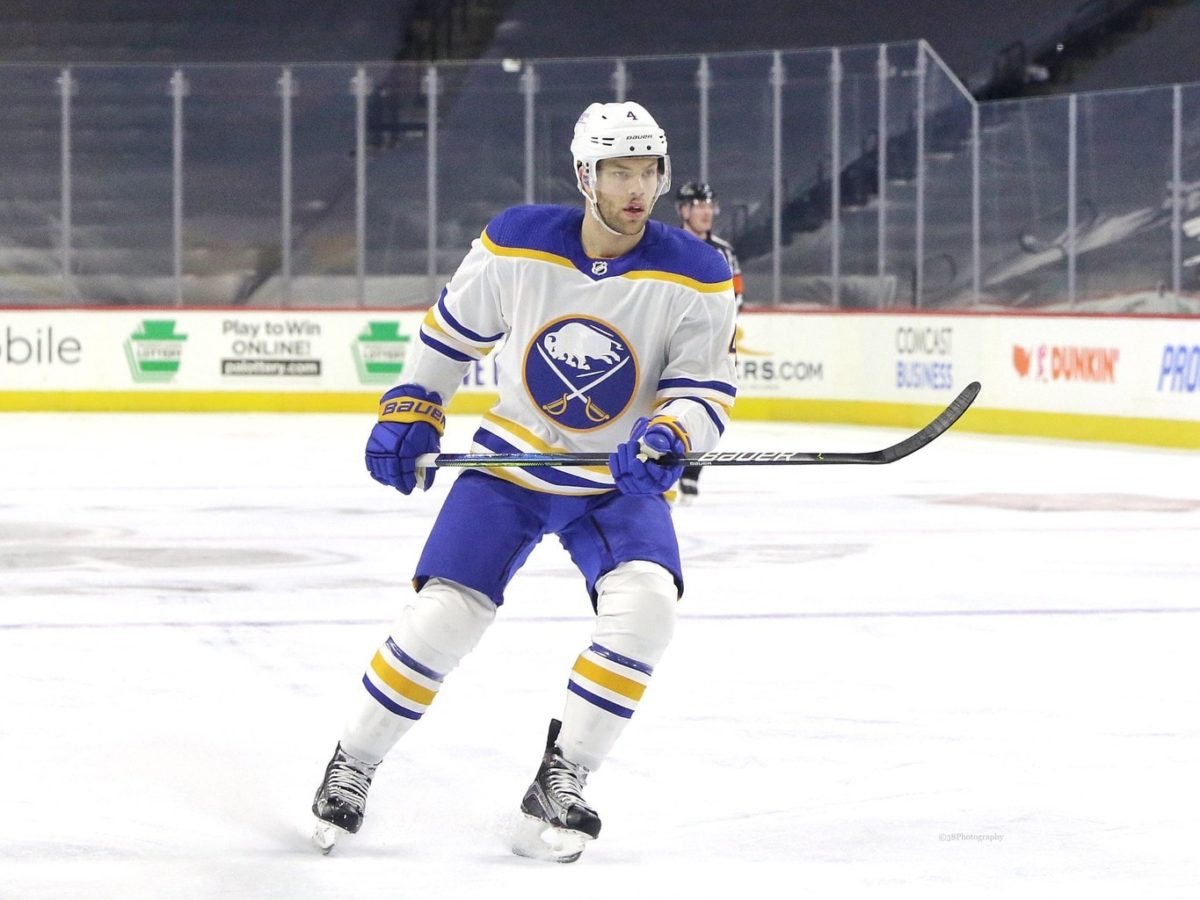The Buffalo Sabres have been a nonentity for the better part of the last 15 years, there’s no two ways about it. Because of that, it’s easy to forget that their history prior to that is actually very strong for the most part. Despite not having a Stanley Cup championship to their name yet, the Sabres have had plenty of success in their history and have been competitive more often than not (the last 13 seasons notwithstanding).
That being said, they’ve had their fair share of failures as well, and not just in recent history. Ranking the worst seasons in the history of any team is actually much easier than ranking the greatest because failure is much more objective and easier to agree upon. Being negative is never fun, but let’s examine the five worst seasons the Sabres have had in their history and what it was that made them so bad. You might even notice a few recurring themes.
#5: 1986-87
The Sabres’ first few seasons were tough but we won’t count them because most new teams struggle in the early going. Their first truly bad season didn’t come until their 17th, a testament to how good they were throughout their formative years. After 11 consecutive playoff appearances from 1975 to 1985, the team began to sputter in the second half of the decade. After narrowly missing out in 1986, the downward spiral continued the following season and took the Sabres to a low they had yet to experience.

Franchise cornerstone Gilbert Perreault retired in November 1986 after 1,191 games and 1,326 points in the blue and gold. The absence of the Hall of Famer was a considerable one and his team foundered without him. The Sabres played to a 28-44-8 record and just 64 points (their lowest total since 1972), handing them their first-ever last-place finish in the NHL. The subsequent opportunity to select the coveted Pierre Turgeon first overall in the 1987 Draft seemed to be the only positive to come out of the season.
What’s truly peculiar is that these Sabres weren’t devoid of talent by any means. In fact, that season they featured three additional Hall of Famers besides Perreault: Dave Andreychuk, Phil Housley and Tom Barrasso. Andreychuk and Housley were typically excellent with 73 and 67 points, respectively. In goal, Barrasso didn’t exactly have the best season of his career but still played well enough to give his team a fighting chance. How the Sabres still managed to perform so poorly is anyone’s guess.
The struggle bus seemed to finally catch up to a team that had largely managed to avoid it and the Sabres somehow went through three different head coaches that season (Scotty Bowman, Craig Ramsay and Gerry Meehan). Fortunately, the bad times didn’t last long and Turgeon helped bring the team back to the playoffs the following season with a dramatic 21-point improvement. Nevertheless, 1986-87 was the first experience of mediocrity for the Sabres and their fans and that feeling never quite leaves you.
#4: 2017-18
After a disappointing 2016-17 season, the Sabres made the first of many attempts to start over under owner Terry Pegula. After three ruinous years as general manager (GM), Tim Murray was fired and head coach Dan Bylsma alongside him. Both men’s visions had failed to materialize and the franchise tried to wipe the slate clean by bringing back two alumni. Jason Botterill was named GM and Housley took over behind the bench. Both moves felt cathartic at the time and there was hope that the Sabres would rebound, but that was never going to happen.
In hindsight, the 2017-18 campaign never had a chance of being anything other than a transition year at best. Botterill and Housley were both tasked with cleaning up the monumental mess they inherited, but such was never going to happen quickly. Similar to the 1986-87 team, the Sabres were actually loaded with talent at the time with Jack Eichel, Ryan O’Reilly and Sam Reinhart on board amongst others. But this was still the same team that Murray had so poorly constructed from top to bottom and the newcomers were never going to salvage it.

That summer optimism quickly faded and it became evident that this team was dreadful in just about every sense. The Sabres played to a 25-45-12 record and finished comfortably in last place in the league, the third such occurrence in five seasons. They were clearly awful but what was worse was that they were also incredibly uninteresting. Beyond the top stars, the team was comprised of a truly random assortment of no-names that fans simply didn’t care about and investment seemed to be at an all-time low.
It was an extremely disheartening season for the Sabres but their suffering was rewarded when they won the first-overall pick of the 2018 Draft, something that hadn’t been the case before (we’ll get to that). Rasmus Dahlin became the first player since Turgeon to be selected first overall by Buffalo and he has since become the face of the franchise. Did this make it all worth it in the end? You be the judge.
#3: 2014-15
Though 2017-18 was brutal enough to endure, it still somehow paled in comparison to what had happened just a few years prior. The Sabres were fresh off a very, very bad 2013-14 season that saw the team finish in last place for the first time since 1987 but lose the Draft Lottery and receive the no.2 overall selection instead. However, the 2014 Draft was inconsequential and it was the following year’s iteration that everyone had their sights set on.
Connor McDavid and Jack Eichel headlined the most talented draft class the NHL had seen in years and were guaranteed to go first and second overall, respectively. That’s where things get dicey from Buffalo’s perspective. The Sabres were not a good team at that time and stood no chance of being competitive during the 2014-15 campaign, which proved to be as awful as expected. But did they ensure that this was the case so that they’d have a bona fide chance at the two stars? It’s very tough to deny that wasn’t the case.
The season was so dreadful for the Sabres, in fact, that other teams accused them of throwing it. The Sabres themselves adamantly denied such, but suffice it to say that nobody believed them, and that includes their own fanbase. Since it meant McDavid would be headed their way, most Buffalonians gleefully ran with the idea while others rejected it as unethical. It became a polarizing mess that turned then-First Niagara Center into hockey’s most toxic environment, with the home crowd audibly cheering when the Arizona Coyotes defeated the Sabres in overtime that March.
Intentionally or not, the Sabres indeed finished in last place once again with a 23-51-8 record. But in a hilarious bit of irony, it was all for naught as they lost the Draft Lottery for the second consecutive season and missed out on McDavid. Eichel could and should have been the pot of gold at the end of the rainbow but we all know by now how his tenure in Buffalo went, adding further insult. The 2014-15 season was a dumpster fire in every possible sense for the Sabres and the suffering fans endured didn’t even pay off in the end. Chalk this one up as a loss.
#2: 2002-03
In the fall of 2002, the Sabres were already headed downward and finally arrived at rock bottom with their worst season since 1986-87, finishing fifth-last in the league at 27-37-18. Despite a career-best showing from top forward Miroslav Satan, the team was lifeless throughout, particularly during the month of November in which it won just one of 13 games. Strangely enough, however, that isn’t even the reason that this season is remembered so negatively amongst fans.
When a season is deemed a failure, it’s usually owing to the way the team played. Oddly enough, the play on the ice was a subplot during the 2002-03 campaign for the Sabres and it was what was happening off it that was the center of attention. Owner John Rigas was indicted by the federal government in May 2002 in connection to the Adelphia Scandal and the NHL stripped him of the franchise. The orphaned Sabres were facing relocation if a new buyer didn’t come forward, but for nearly a year, none did.

Buffalonians spent the entire saga wondering whether or not their beloved team was destined to depart, something that seemed increasingly realistic with each passing day. At last, in March 2003, Rochester, NY businessman Tom Golisano emerged with an offer that was accepted by the NHL, and the Sabres were saved, bringing a 10-month period of nerve-wracking uncertainty to an end. This allowed the front office to finally make hockey transactions again after essentially being handcuffed the entire time.
It was too late to salvage anything of the 2002-03 campaign by that time, but the Sabres continued their rebuilding efforts and saw a major resurgence in the years that followed. While it wasn’t quite the worst season the team has ever had in terms of on-ice play, it was without question the franchise’s darkest hour and a time that no fan is keen to revisit. The Sabres may frustrate us to no end at times, but we should all keep in mind that there was a point where we almost didn’t have them at all.
#1: 2021 (“The COVID Season”)
The 2010s were such a dismal decade that by the time 2020 rolled around, Sabres fans were certain that they had seen the worst of the worst, but boy were they wrong. There was actually quite a bit of hope going into the COVID-shortened 2021 season. The Sabres made it a priority to stock up on offense to complement Eichel and made their biggest free agent signing ever: former MVP Taylor Hall. They also added veteran stalwart Eric Staal for further depth and when the team returned to the ice in Jan. 2021 after nearly a year off, the possibilities seemed endless.
The subsequent 56-game season proved to be historic, but in the worst possible sense, and just about everything that could have gone wrong for the team did. For starters, the expected partnership between Hall and Eichel never materialized as Hall just couldn’t seem to get himself going and Eichel suffered a neck injury that ended his season after 21 games. Additionally, Jeff Skinner struggled so immensely that he was eventually benched by coach Ralph Krueger, causing fans to turn on the formerly popular bench boss.

The result was the worst hockey that Sabres fans have ever witnessed, and that’s not hyperbole. Buffalo won just 15 games and from Feb. 27 to March 27 lost 18 in a row, tying the NHL record. If that doesn’t fully demonstrate how awful this team was, think of it this way: that’s nearly a full calendar month between wins. Hall was traded at midseason, Krueger became the sixth coach fired by the Sabres in seven years and Eichel never appeared again in the blue and gold. It’s a good thing that no spectators were permitted due to the pandemic because they probably would have been playing in an empty arena regardless.
Related: Buffalo Sabres Name Rasmus Dahlin Captain
In the end, the Sabres played to a 15-34-7 record and finished in last place for the fourth time in eight years. The season was an unmitigated disaster in every possible sense, there’s just no putting a positive spin on it at all. Buffalo won the Draft Lottery with ease and used the first selection on Owen Power, another potential franchise defenseman. But even with that in mind, this was the lowest point the Sabres (as a team) have ever descended to, plain and simple. Fans hope and pray that this was as bad as it gets, but only time will tell.
Was there a season not included here that would have made your list? What do you think the Sabres’ worst campaign ever was?
